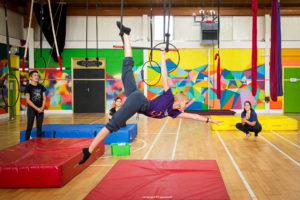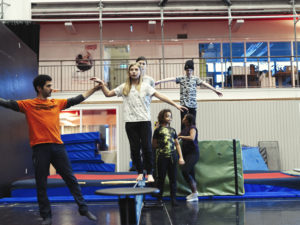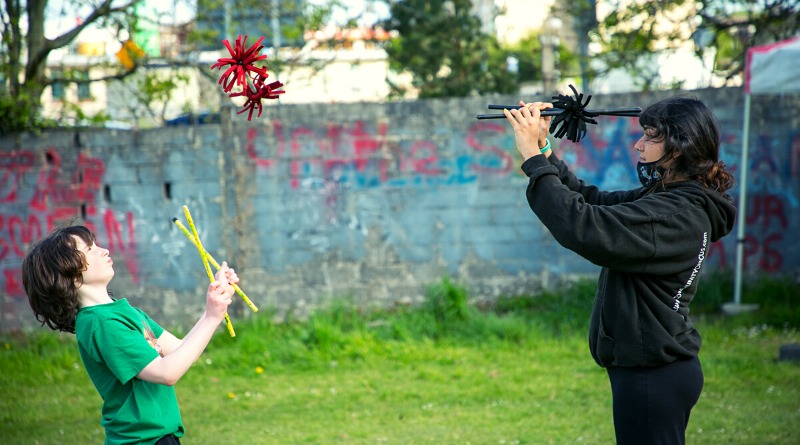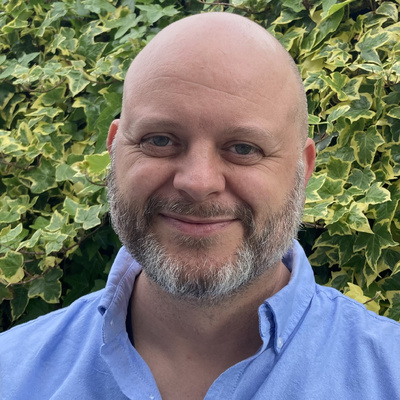Launch of New European Degree in Youth and Social Circus Pedagogy
In a world increasingly obsessed with measuring and showing success, it is refreshing, radical even, to have a discipline dedicated to young people and marginalised communities that values learning through a sustained dedication to failure. In order to learn how to balance on a unicycle, walk on stilts or on a high wire, a young person must learn to fall correctly, to fail correctly, to continue to try and fail until they accomplish the task.

Unlike the professional circus, Youth and Social Circus does not ask its participants for mastery of a technique to show off their skill, but instead encourages them to take joy in the process of the practice itself, to revel in effort and failure. This and many more aspects of the teaching methods (pedagogy) of Youth and Social Circus fascinate me. What surprised me more was that, despite its appealing and innovative approaches to education—ones that I believe have important applications beyond the circus—there was no formal university-level qualification for professional teachers of Youth and Social Circus.

As a Lecturer in Theatre Studies at the National University of Ireland, Galway, I was fortunate to be given the opportunity to satisfy my interest in this area in 2019, when I was invited to partner with the Circus++ project. Funded by Erasmus+, Circus++ partners three universities and five circus schools, including Tampere University and Sorin Sirkus (Finland), Stockholm University of the Arts and Cirkus Cirkör (Sweden), my university and Galway Community Circus (Ireland), Le Plus Petit Cirque de Monde (France), CIRQUEON (Czech Republic) and the Caravan International Youth and Social Circus Network, to help develop a new pan-European BA in Youth and Social Circus Pedagogy. Three years later, and the core curriculum for this exciting new degree is to be launched. In addition to the curriculum, the international partners have created five national implementation plans, a model for recognition and validation of prior learning, and a model for student mobility that allows students to take modules from the degree in different countries.

We designed the programme to be a three-year course of study, structured according to three progressive pathways: Circus Techniques, Didactics and Creativity, and Youth and Social Circus. Modules on communication skills for circus teachers, research on Youth and Social Circus, and project management are also offered. The educational theorist Thomas Carruthers wrote that ‘A teacher is one who makes himself progressively unnecessary.’ This advice was foremost in our minds as project partners as we built the degree to be student-centred in approach, with students progressing from teacher-led classes in the first two years towards more independent work in their final year as they become autonomous critical thinkers and individual creative practitioners.
It is our intention that admission to the programme is as inclusive as possible, with the prospective student body made up of not only participants in Youth and Social Circus schools and other performance arts (e.g., dance, theatre), but also those who are involved in youth organisations or associations working with people with fewer opportunities, and those who have different backgrounds in teaching of all kinds.
National implementation plans for the partner countries, Finland, the Czech Republic, France, Ireland, and Sweden, were devised with the aim of demonstrating the possibilities and limitations of incorporating the degree— or aspects of the curriculum—within existing university structures, degree programmes, and educational initiatives. Already courses based on the curriculum have been created and will be made part of established degree offerings in Drama and Theatre Studies and Children Studies at the National University of Ireland, Galway.

These plans will be presented as part of the launch of the Circus++ Report and the European Core Curriculum for the BA in Youth and Social Circus Pedagogy, happening at the Circus Pedagogy: The Future of Creative Education conference in Tampere, June 15-16, 2022. The conference invites attendees to learn about innovative research-based practices in Youth and Social Circus pedagogy from leading experts around the world. It promises a packed programme of keynote lectures, workshops, roundtable discussions, and a performance from Sorin Sirkus. Emmanuelle Lyon, Professor of Dance at École Nationale des Arts du Cirque de Rosny-sous-Bois and École du ballet de l’Opéra de Paris, will deliver a keynote address on the quest to increase the technical and expressive potential of students and future youth and social circus educators. Ylva Hofvander Trulsson, Professor of Aesthetic Didactics and Head of the Department of Dance Pedagogy at Stockholm University of the Arts, will situate circus pedagogy within the broader field of arts pedagogies in her university and speak about trends in arts education pedagogies in Scandinavian higher education.
As well, international circus practitioners and a wide range of academics with specialties in education, circus, theatre, dance, sport, fitness, and children’s studies will also speak at roundtable discussions with themes such as the future of Circus Teacher education; circus pedagogy in the Academy; the practice of social circus around the world; and the responsibilities of circus pedagogy in terms of inclusivity and sustainability. Members of the Circus ++ Project will deliver workshops indicative of the content of the curriculum of the new degree. These include classes on improving creativity through juggling, communication within groups through circus pedagogy, somatic practice in circus techniques, and inclusive circus pedagogy.
The conference is free of charge, but there are a limited number of tickets, so those interested are encouraged to register early. To register and for more information on the conference, you can visit the website https://events.tuni.fi/socialcircus2022.

All images credited to Anita Murphy and Camille Kirnidis. Main image taken by Anita....
Do you have a story to share? Submit your news story, article or press release.




